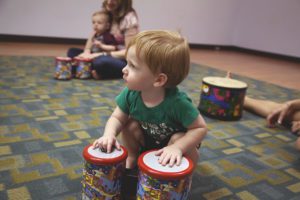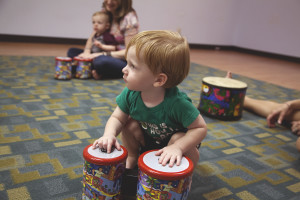Motherhood Music is a unique world music and culture program for children and their families. Our program is based on the All Around This World curriculum, built by creator, Jay Sand, and offered by certified instructors from Vanover Music Academy in Houston. It was built on the shoulders of centuries of inspiring research about young children and how they develop psychologically, educationally, culturally and musically.
 Motherhood Music classes will bring a love of music that is bound to inspire. Many influential people and methods were used to help build the curriculum. One of the most widely respected and practiced approaches to early childhood music education–the Kodaly Method was one that helped to form this program. Based upon the theories of Hungarian composer Zoltan Kodaly, the “Kodaly Method” has developed into a comprehensive approach to music education in which teachers introduce small children to rhythm patterns and scales step by step in developmentally-appropriate sequences. Kodaly not only believed children must start music instruction at an earlier age than his mid-19th century contemporaries, but also that children would best come to appreciate and understand music by becoming familiar with high quality Hungarian folk songs. While the curriculum uses songs from literally hundreds of different countries, cultures and musical genres, both agree that even the smallest children can differentiate music that has integrity and depth from the typical “children’s music” used in most early childhood programs.
Motherhood Music classes will bring a love of music that is bound to inspire. Many influential people and methods were used to help build the curriculum. One of the most widely respected and practiced approaches to early childhood music education–the Kodaly Method was one that helped to form this program. Based upon the theories of Hungarian composer Zoltan Kodaly, the “Kodaly Method” has developed into a comprehensive approach to music education in which teachers introduce small children to rhythm patterns and scales step by step in developmentally-appropriate sequences. Kodaly not only believed children must start music instruction at an earlier age than his mid-19th century contemporaries, but also that children would best come to appreciate and understand music by becoming familiar with high quality Hungarian folk songs. While the curriculum uses songs from literally hundreds of different countries, cultures and musical genres, both agree that even the smallest children can differentiate music that has integrity and depth from the typical “children’s music” used in most early childhood programs.
Another popular method of early childhood musical instruction used to develop this program was Orff-Schulwerk. Based upon the work of German composer Carl Orff, the Orff-Schulwerk approach to music education is, in the words of the American Orff-Schulwerk Association, “based on things children like to do: sing, chant rhymes, clap, dance, and keep a beat on anything near at hand.” Like Motherhood Music classes, Orff-Schulwerk programs engage children in group music-making, putting instruments such as xylophones and glockenspiels into their hands and emphasizing the joy of making music as a first step to technical music instruction.
The greatly admired work of Swiss composer, musician and educator, Emile Jaques-Dalcroze helped the curriculum develop an approach to music instruction that teaches children about music with movement. The Dalcroze approach consists of three core elements–“eurhythmics” (the study of music through movement), “solfege” (a technique used to develop an understanding of tonality, scale and pitch), and improvisation using movement, voice and the playing of instruments.
In addition to the previously mentioned music educators, Shin’ichi Suzuki was also a part of the development of the curriculum. Motherhood Music is not only interested in helping children develop a lifelong love of music, but we believe that children who are in what Suzuki called the “right environment” for learning music will develop a strong character in the process of their musical development. Suzuki also deeply believed in the many benefits of parental involvement in a child’s musical, and personal development.
These aforementioned influential early childhood music educators along with many others such as Lilian Katz and Edwin Gordon have been studied time and time again and have helped to form the basis for our program.
For more info on Motherhood Music children’s classes or to register, call us at 713.963.8880. We look forward to making music with our family!



